|
|
Reviewed by Glenn Erickson
Something of a big deal on its initial release, Edward Dmytryk's The Young Lions couldn't help but get attention thanks to its ultra-stellar male cast. Marlon Brando was very, very hot stuff in 1958, still a number one sex symbol seven years into the movie star game. Another 'method' phenomenon Montgomery Clift was on the downgrade, his career (and self-confidence) tripped up by an auto accident that destroyed his good looks. Freshly escaped from his partnership with Jerry Lewis, Dean Martin's acting training had been mostly a learn-on-the job effort, but he wanted very much to be a major dramatic actor.
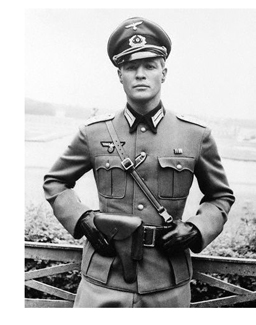
After a script reshuffle to juggle the balance between the three stars, the movie from Irwin Shaw's novel plays very much like watered-down James Jones. The stories stay separate, and although the show takes in scenes in Bavaria, New York, Vermont, London, North Africa and Germany, we still feel that we're on a set-bound drama with just a few actors. Montgomery Clift partly retraces his character arc from From Here to Eternity. Marlon Brando's idealistic and sensitive German now seems a laughable stereotype. It can't have felt particularly honest then -- I remember Mad magazine making fun of revisionist war movies that assured us that some poor young Wehrmacht officers were (sniff) just trying (boo hoo) to do the right thing, looking for love in all the wrong places. Ach du lieber, Gretel, it was rough being part of the Nazi onslaught. Perhaps by default, Dean Martin comes out on top. Dino's natural acting personality seems as real as Clift's intensity and Brando's tics and tricks, and his character has less 'author's message' baggage to carry.
The war epic traces the careers of three WW2 soldiers -- two American privates and one German lieutenant. Sensitive Christian Diestl, a former ski instructor (Marlon Brando) hasn't reconciled his personal beliefs with the appalling aims of the Nazis, and undergoes a slow demoralization as the war proceeds in North Africa. He's particularly discouraged by his superior Captain Hardenberg (Maximillian Schell) an egotist who delights in killing. Diestl wins over a resentful Frenchwoman (Liliane Montevecchi) and enjoys the company of Hardenberg's corrupt wife, Gretchen (May Britt). Meanwhile, big-time New York musical comedy singer Michael Whiteacre (Dean Martin) is flummoxed because he can't evade the draft. His society girlfriend Margaret Freemantle (Barbara Rush) is disappointed with his unpatriotic attitude. In boot camp, Whiteacre makes friends with Jewish-American Noah Ackerman (Montgomery Clift), who has just married white-bread New England girl Hope Plowman (Hope Lange), and is very much in love. Ackerman becomes the victim of anti-Semitic discrimination in the barracks. He fights back, deserts and is imprisoned, while Whiteacre pulls strings and gets himself transferred to London. In the spring of 1945, Ackerman and Whiteacre are together during the massive push into Germany, while Diestl tries to survive the German retreat. The three men finally come together on a road outside of a concentration camp.
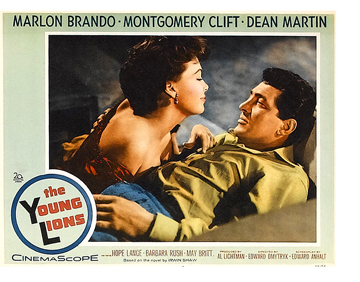
When a movie is described as anti-war, the joke now is that nobody can name a pro-war movie. In reality, all war movies are pro-war when it comes to being good advertising for the promised action, adventure, danger and camaraderie that filmed combat makes look so exciting. The real distinction in war movies is between conservative pictures that basically recruit for the armed services, and liberal shows that purport to deliver the message that War is cruel and pointless and dehumanizing. If they don't have a career or business stake in the war game, combat veterans already know that war is an abomination. Us civilian movie fans across the spectrum nod thoughtfully while enjoying the dehumanizing action and violence.
Taking the cue from war-memoir writers like James Jones, American movies spent twenty years interpreting the war as entertainment. Some 1950s movies claimed to be telling us the true raw story about the army experience, but all none were as critical as the books. Securing armed forces cooperation required filmmakers to endorse the Army in one way or another. Robert Aldrich's critical Attack! was refused cooperation entirely. But big movies needed tanks and troops, and to hire them at bargain prices (often for free) made sure that controversial content was smoothed over or eliminated entirely. Like The Young Lions, Fred Zinnemann's From Here to Eternity is careful to show the Army reacting strongly to a bad-apple officer. More typical is The Naked and the Dead, which is now embarrassing in its outright kowtowing for army approval; it plays like a bad recruiting advertisement. The genre eventually subsided into pure escapism based more on action themes than realism (Von Ryan's Express, The Dirty Dozen). Back in the middle of the liberal movement came The Young Lions. Considered a major method-acting fest, it now seems just an overgrown curiosity.
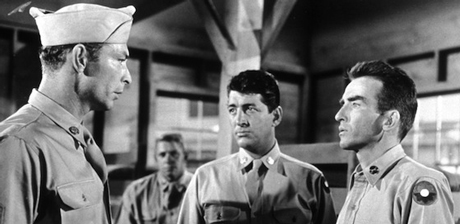
The culprit has to be Edward Dmytryk, the only film director among the original Hollywood Ten. When Dmytryk sold his soul to recover his Hollywood career, he seemingly forfeited his artistic edge as well. As the industry's token rehabilitee, most of Dmytryk's post-blacklist films play like anonymous hackwork, and are really producers' movies. The epic, beautifully cast Raintree County may be the worst directed mess of the decade, a case of excellent ingredients totally ruined. Dmytryk shoots every scene in The Young Lions so flatly that it plays like a procession of dislocated close-ups and two shots. The actors do well under the circumstances, and of course Montgomery Clift and Marlon Brando are fascinating to watch, but the movie suffers.
The script is the next culprit. It lifts liberally from James Jones. Clift's ordeal by combat against his anti-Semitic comrades, followed by the Army's reprimanding of the officer who allowed it to happen, wastes half an hour in a dull remake of the Zinnemann film. The mildly 'sympathetic' German of earlier war films (oh, The Desert Fox for one) emerges full-blown here as a misunderstood Rebel Without a Swastika. We discover that our tortured Christian Diestl is really a nice guy who'd rather be skiing with his life-loving pals. I'd think that anyone with Diestl's ethical makeup would have made up his mind on the moral matters of his army life long before reaching the rank of Lieutenant in the German officer corps. Deistl would either have been given the iron boot, or would have learned to stop worrying and love the Reich.
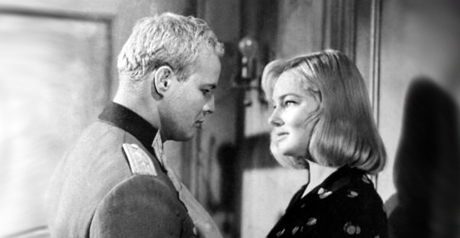
In love with its own ironies, The Young Lions touches on big issues but doesn't tackle any of them. Clift's touching romance with Hope Lange spends an entire scene setting up a potential bigotry conflict, which then evaporates. For a 'daring' conclusion, the show grapples with the horror of the extermination camps. Our decent German hero is sickened to discover what's going on there, a revelation that sends him into the final stages of mental confusion. We have to sit and watch Diestl listen to an SS officer complain loudly that the high command wants him to kill all 60,000 of his prisoners, when all his guards have deserted. It's like Diestl's dropped in on another war movie genre, just long enough for The Young Lions to 'make its point' about those simply unacceptable concentration camps.
Then, a decent U.S. officer (Arthur Franz) shows the audience that everything will work out thanks to superior American morals. Viewers get to enjoy a bit of righteous indignation when Franz verbally threatens an asinine German Mayor. That'll show 'em. Irwin Shaw and screenwriter Edward Anhalt give us one of the first modern downbeat war-movie endings; Brando demonstrates his commitment to the role with a final stunt that leaves him face down in a muddy ditch. Bob Hope wouldn't do that. Too bad, though, that Dmytryk shoots the scene in such an uninteresting way.
Dean Martin's first serious film role represents a nice contrast with the method stars. He's always been more of an unforced acting personality than a trained talent, like Robert Mitchum. Marting is more in control in the same year's Some Came Running, but he's not at all bad here, except maybe in his drunk London scene. Of the three leads, Martin comes off the best. The Young Lions is also Maximillian Schell's first American film. He had integrity, but inevitably had to play too many guilty Germans. He and Brando look very cool in their mirrored aviator sunglasses, getting ready to attack a British patrol in an African desert.
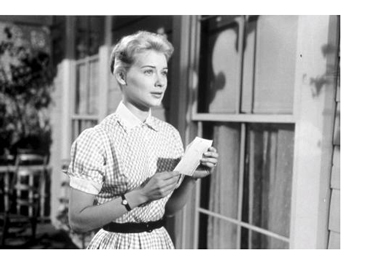
The movie follows the pattern of '50s war movies that injected females into the all-male storylines by whatever means possible. Edward Dmytryk's own The Caine Mutiny is padded with excruciatingly irrelevant scenes of a young naval officer going on leave with his girlfriend, visiting a national park, etc. The Young Lions is much smoother in this regard. As Clift's romantic interest, Hope Lange might be the best thing in the picture; all her scenes come fully to life. Brando's French girlfriend Lillianne Montevecchi does well enough, considering that her character merely acts petulant before presumably falling into bed with the irresistible Diestl. Gotta keep that star happy. Fox contractee May Britt is a before-and-after woman in Brando's life. Early in the war, she's a playgirl who plies Diestl with caviar, so he'll wait for her to return from an earlier date. Later on she's living in the wreck of her apartment, struggling under the Allied bombs.
Whenever The Young Lions has an exterior, the settings are at least passable. Many scenes were filmed in France and Germany, even at a French concentration camp. But Dmytryk never makes us feel that we're anywhere but on a movie set. It's the same dead quality Dmytryk was somehow able to impart to the very expensive Raintree County. All of the money must have gone into the actors, because it's not in the production. Half of a scene in North Africa is stolen from (I think) The Immortal Sergeant, an older Fox film. Stock shots don't mix with the new CinemaScope lensing very well, especially those that have just been cut in flat and allowed to squash out horizontally. Germans drive around in US Army jeeps. Big parts of many exteriors play against rear projections and blank walls. The trailer makes special note of producer Al Lichtman's great career as a 'pioneer of cinema' ... but a look at his one feature credit in the IMDB and you realize that he must have pioneered the secret of keeping the production budget for himself.
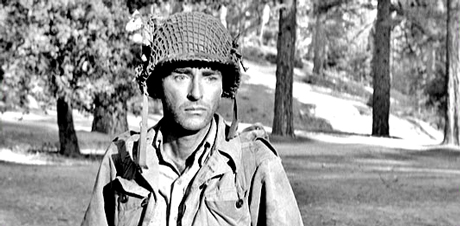
The interior sets are uniformly awful -- flat, dull and lacking in detail. Michael Whiteacre's Manhattan apartment is indistinguishable from Frau Hardenberg's digs in Berlin. Everything has unusually flat B&W studio lighting; we often feel that we're someplace with only two walls. I don't know who's responsible, but even MGM interiors of this time are better. Visually, The Young Lions is D.O.A..
Through all of this, I was entertained to study all the high-powered acting on view. Brando's play with his German accent is never dull, at least. When Montgomery Clift is given a simple non-ironic scene to play, as when he begs Hope Lange to forgive him, or responds to the news that he's going to have a baby, he glows. And Dean Martin has an ease that makes him seem excellent top star material.
The Twilight Time Blu-ray of The Young Lions is a razor-sharp, picture perfect rendering of this 'big' Fox title for 1958. Look closely and you'll notice that CinemaScope might have been the factor that inhibited Edward Dmytryk's direction. C'Scope prefers longer lenses to maintain a flat visual field, so standoffish wide shots prevail. Whenever things get closer we can see evidence of the CinemaScope Mumps. Even in fairly loose two-shots, faces begin to spread out horizontally. Dmytryk has more latitude in bright exteriors, but interior shots avoid compositions with depth.
Twilight Time gives us a trailer, an Isolated Score Track for Hugo Freidhofer's music, and a commentary by TT's hosts Nick Redman and Julie Kirgo, with Lem Dobbs once again sitting in. Ms. Kirgo's insert essay contains a lot of good information about the actor politics behind the movie -- The Young Lions has to be admired for its powerhouse acting trio, even if Brando pretty much wings his scenes on his own.

On a scale of Excellent, Good, Fair, and Poor,
The Young Lions Blu-ray rates:
Movie: Good - (for the performances
Video: Excellent
Sound: Excellent English 5.1 DTS-HD MA
Supplements: Isolated score track, Commentary with Nick Redman, Lem Dobbs and Julie Kirgo, trailer , Julie Kirgo liner notes
Deaf and Hearing Impaired Friendly?
YES; Subtitles: English
Packaging: Keep case
Reviewed: July 4, 2015
Footnotes:
1. Praise from 'Bee' that's too flattering not to print, July 8, 2015:
Dear Glenn: I can't let this go by. Your review of The Young Lions was brilliant on all counts. I'm always complaining about the thoroughly mediocre post- HUAC films by Dmytryk -- it remains unimaginable that this guy was handed so many A-list, blue-chip projects -- but I can't recall anyone ever describing so well (and specifically) how weakly executed his pictures could be.
I liked the work of Irwin Shaw very much. I can't believe how terrible this movie is, and how it has so relatively little to do with Shaw's book. I do get some of Brando's crazy ideas about his "misunderstood German" character, though it's clear that Dmytryk lets this just run away with a lot of the film. [It is sort of watchable, at least.] Clift isn't bad, Martin underplays well... but God, this is a mess. To know this was extensively shot on location makes my body almost seize up; some directors could have filmed this on the lot and given it more style and atmosphere. Joe MacDonald was an excellent cameraman -- I wonder what the story was? Tony Randall might have actually dodged a bullet here.
First rate stuff. Best, Always. -- B.

Text © Copyright 2015 Glenn Erickson
See more exclusive reviews on the Savant Main Page.
Reviews on the Savant main site have additional credits information and are often updated and annotated with reader input and graphics.
T'was Ever Thus.
Return to Top of Page
|



